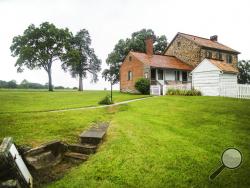GETTYSBURG, Pa. (AP) — For a couple hundred dollars, you can spend the night in a house that survived the Battle of Gettysburg.
The Historic Bushman House was even used as a temporary field hospital then, serving as a stop for injured soldiers making their way to larger field hospitals, according to Savannah Rose, a seasonal ranger with the Gettysburg National Military Park.
The 209-year-old brick-and-stone house stands near 30 S. Confederate Ave. within the Gettysburg National Military Park. It has three bedrooms, including a master bedroom on the first floor; a dining and sitting room; a kitchen; and one-and-a-half bathrooms.
You won't be completely transported back to the Civil War, though. Its kitchen is fitted with modern appliances, such as a microwave, dishwasher and fridge.
The house also received new furnishings and a fresh coat of paint this year. Its roof was also redone to "ensure that it was going to be satisfactory to those staying in the home," Rose said.
The standard rate is $325 a night and the off-season winter rate is $200 a night, according to Recreation.gov. However, that rate could go up to $500 if there's a special commemorative event, such as the anniversary of the Gettysburg Address. You also have to stay for at least three nights.
Rose began researching the Michael Bushman farm, which is where the Historic Bushman House is located, in February and sources much of her information through original and contemporary documents at the Gettysburg National Military Park Library and the Adams County Historical Society.
The original stone portion of the house was built in 1808 when Samuel Bushman owned the property, Rose said. Back then, it had two rooms and several closets on the first floor and another two rooms and an attic on the second floor.
Sophia Hammer came into possession of the property in 1829. Amelia Hammer, her daughter, would later marry Michael Bushman, Samuel Bushman's great-nephew, in 1834.
Sophia Hammer wrote him into her will, Rose said. It stated that Michael Bushman would inherit the property upon her death, which he did. The will also stated that Michael Bushman and Amelia Hammer's children would inherit the land upon their deaths.
Michael Bushman would later add the brick section of the house in 1860, which included a dining room and the kitchen as we know it today.
It was on this land that Michael Bushman grew wheat, vegetables and other crops. However, he was best known for being a minister in the German Baptist Brethren church, which would later be known as the Church of the Brethren in 1908, Rose said.
"He became a huge name in the church nationwide and had several roles within the church itself, such as performing marriages and visiting those who misbehave from church rules," Rose said.
During the Battle of Gettysburg in 1863, Michael Bushman lived in another house in Gettysburg, Rose said. When he returned to his farm after the battle, Michael Bushman found his fences torn down and his land dug up for trenches. He also found eight Confederate soldiers buried behind his barn.
"The home itself not only represents the Battle, but also a man who lived in Gettysburg before and after the three-day event," Rose said. "He had a life before the Battle, and then did all he could to have a life afterwards."
However, Michael Bushman and Amelia Hammer did not have any children. She died in 1875, and Michael Bushman later married Louisa Rupp in 1878. However, Louisa Rupp could not inherit the property because she was not named in Sophia Hammer's will.
Michael Bushman died in 1893.
The property was then sold May 14, 1894, to the Gettysburg Battlefield Memorial Association, which was the first organized attempt to preserve the battlefield, Rose said. The land was later transferred to the National Park Service in 1933.
___
Online:
http://bit.ly/2uiWggL
___
By J.C. LEE, Pennlive.com

